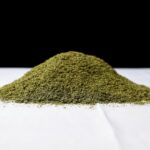Industry publications have been reporting that an increasing number of companies have begun using “precision fermentation” to produce a variety of high-value food ingredients, nutraceuticals, personal care products, and more. We’ve asked Mr. Jiancheng Qi, Bioresource and Food Processing Research Unit Lead & Fermentation Engineer, Agri-Food Discovery Place at the University of Alberta, to answer a few questions and provide some insight on this exciting, emerging biotechnology.
KeyLeaf: What is precision fermentation?
Mr. Qi: It is my understanding that precision fermentation is a neologism initially used by the food industry to describe the precisely controlled fermentation process of using genetically engineered microorganisms to create biologically identical animal proteins for animal-free meat, dairy, and eggs, and to differentiate advanced biosynthetic technology from the traditional food fermentation process.
As the term precision fermentation is rapidly gaining recognition, it has also become a synonym for industrial fermentation technology or biosynthetic technology. Industrial fermentation is the process of using microorganisms to make value-added products, including biomass, extracellular metabolites, intracellular components, and transformation of the substrate, based on suitable microorganism strains, fully understood biosynthetic pathway, optimized nutrient composition, and specified growth conditions. Industrial fermentation technology has been around for many decades and the fermentation industry has long been a well-established industry sector making numerous essential or important products such as antibiotics, vitamins, enzymes, proteins, amino acids, organic acids, alcohols, sugar alcohols, natural colors, sweeteners, flavors, gums, omega-3 PUFA, probiotics, bio pesticides, bio fertilizers, biofilms, biofuels, cannabinoids, etc.
KeyLeaf: What are a few high-value products that are now being routinely produced using precision fermentation?
Mr. Qi – Antibiotics
-Antibodies
-Probiotics and Cultures
-Active yeast or Baker’s yeast
-Enzymes, such as amylase, cellulase, xylanase, pectinase, protease, lipase
-Proteins
-Amino acids, such as lysine, monosodium glutamate
-Organic acids, such as citric acid, lactic acid, acetic acid
-PUFA, such as DHA, EPA
-Vitamins, such as beta-carotene, vitamin B12, vitamin B2
-Natural color, such as Monascus color
-Sugar alcohols, such as xylitol, erythritol
-Gums, such as xanthan gum, Gellan gum
-Ethanol
-Acetone and butanol
-Glycerol
KeyLeaf: Producing a high-value product using precision fermentation has been described as “only half the processing battle”. The other half of the battle is properly extracting and refining the high-value compound that’s been created by the fermentation process. Why is proper “downstream processing” crucial for producing a fermented product that properly functions in the application for which it was designed?
Mr. Qi: Yes, the fermentation process is described as the “upstream process” in the fermentation industry, which is only half the processing line. The broth obtained after the fermentation process is typically a mixture of water, biomass, extracellular metabolites, residue sugars, and other un-fermentable components, containing targeted valuable bioproducts that are either the biomass, extracellular metabolites, intracellular components, or all of them. Those biological products need to be extracted and purified through a downstream process in order to obtain finished products that meet the quality specs.
Downstream processing involves a series of unit operations of separation, extraction, purification, and dehydration based on chemical and biochemical engineering technologies, as well as the physicochemical properties of the desirable bioproducts. Every bioproduct obtained from the fermentation process is unique; therefore, biochemical, chemical and mechanical scientists and engineers must work together to test, design, and optimize the downstream processing that is with high efficiency, cost-effective, and fit for product quality for the market.
KeyLeaf: What impact do you predict that precision fermentation will have on these industries: Food & Beverage; Nutritional supplement; Pharmaceutical; Medical; Cosmetics; and other industries/sectors?
Mr. Qi: I think precision fermentation will have an impact on all sectors above. However, we may expect more companies in the Food & Beverage, Nutritional supplement, and Pharmaceutical sectors to start to adapt precision fermentation for new products and markets.
KeyLeaf: What impact do you envision that precision fermentation will have on the environment, short term and long term?
Mr. Qi: I agree that precision fermentation will have a long-term positive impact on the environment by reducing agriculture input, and creating sustainable food, nutrition, and consumer products. It is important to realize that some new commercial fermentation plants could also create pollutants such as wastewater and greenhouse gas emissions, which must be properly treated to protect the environment in the short term.
KeyLeaf: Are you aware of any major food companies (like DuPont or DSM) developing fermentation-derived product lines?
Mr. Qi: Yes, I’m aware that many major food companies such as DuPont, DSM, BASF, Cargill, and many others, either already have or are developing fermentation-derived product lines. For example, fermentation or biotechnology is a major platform at DSM in making different food and nutritional ingredients including omega-3 DHA, cultures, probiotics, enzymes, gums, dairy-like proteins, and sweeteners.
KeyLeaf: What other thoughts or observations do you have concerning precision fermentation?
Mr. Qi: The development and commercialization of a high-value new product through precision fermentation technology can be very difficult and requires long-term commitments and high investments. I am afraid some companies or entrepreneurs who are excited about the potential of precision fermentation might have underestimated or overlooked the challenges.
KeyLeaf: Thank you, Mr. Qi
About KeyLeaf
For over 40 years, KeyLeaf Life Sciences has had a global impact on the food, beverage, nutraceutical, cosmetics, and bio-product industries. They are the world’s leading authority in proprietary plant extraction technologies and ingredient innovation. With a focus on industrial hemp, KeyLeaf continues to push the boundaries of plant-based protein research, leveraging proprietary extraction technologies, isolation of key compounds and molecules, and developing and commercializing new products and applications. To that end, they have assembled a catalog of high-value ingredients and fractions developed by the company’s pioneering R&D team at the leading edge in the plant-protein space. In addition to providing contract R&D, extraction, and processing services, they license, collaborate, and partner in a B2B model giving companies a unique marketing advantage for their products. KeyLeaf Life Sciences.












